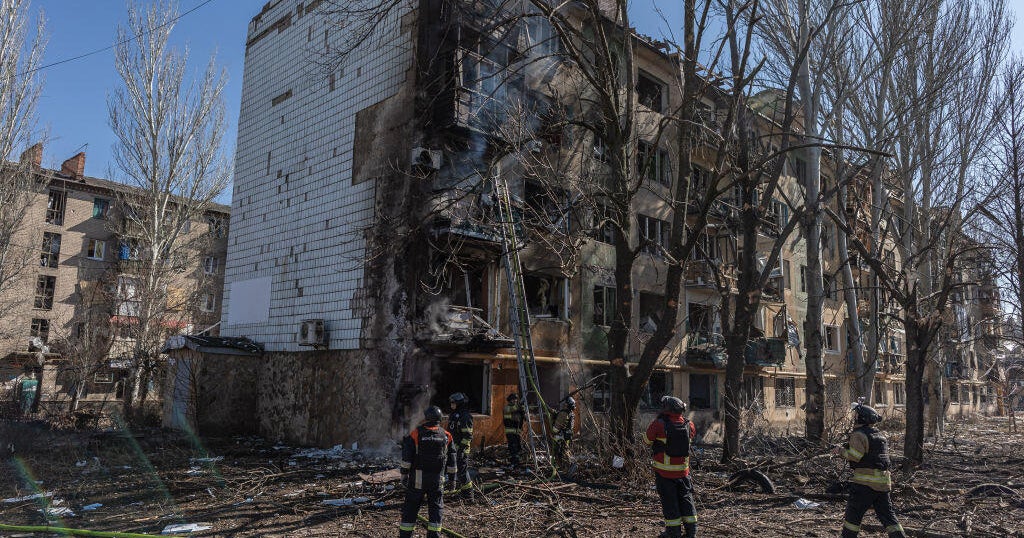Clashes flare in Hong Kong ahead of anniversary of communist rule in China
Hong Kong — Protesters and police clashed in Hong Kong for a second straight day on Sunday, throwing the city's business and shopping belt into chaos and sparking fears of more ugly scenes leading up to China's National Day this week.
Riot police repeatedly fired blue liquid — used to identify protesters — from a water cannon truck and multiple volleys of tear gas after demonstrators hurled Molotov cocktails at officers and targeted the government office complex. It was a repeat of Saturday's clashes and part of a familiar cycle since pro-democracy protests began in early June.
"We know that in the face of the world's largest totalitarian regime — to quote Captain America, 'Whatever it takes,'" Justin Leung, a 21-year-old demonstrator who covered his mouth with a black scarf, said of the violent methods deployed by hard-line protesters. "The consensus right now is that everyone's methods are valid and we all do our part."
Protesters are planning to march again on Tuesday despite a police ban, raising fears of more violent confrontations that could embarrass Chinese President Xi Jinping as his ruling Communist Party marks 70 years since taking power on Tuesday. Posters are calling for October 1 to be marked as "A Day of Grief."
"So many youngsters feel that they're going to have no future because of the power of China," Andy Yeung, 40, said Sunday as he pushed his toddler in a stroller. "It's hopeless for Hong Kong. If we don't stand up, there will be no hope."
The roots of this struggle between protesters and the Chinese government date back to 1997, when the U.K. handed Hong Kong back to China. The U.K. and China agreed Hong Kong would be semi-autonomous, in charge of its internal affairs until 2047. That's when the city is set to revert to full Chinese rule.
But for now, Beijing has the power to appoint who runs for Hong Kong's chief executive, its top leader. "The power is not with the people in Hong Kong; the power lies in Beijing," said Claudia Mo, a pro democracy legislator. "That's the 'Big Brother,' the big boss."
The protests, which are now in their third month, were sparked by Hong Kong chief executive Carrie Lam's now-shelved extradition bill and have since snowballed into an anti-China movement. The embattled leader of Hong Kong announced earlier this month that she was withdrawing the massively controversial extradition bill that would have given Beijing the power to spirit people away into China's opaque legal system.
The protests began in June — at first peacefully, with a million-person march organized by activist Bonnie Leung and the Civil Human Rights Front. Since then the protests have become more violent. Extreme members of the movement have assaulted government offices in the city with firebombs, and others jammed the roads and rail links to the airport to gain international attention.
The demonstrators have added to their list of grievances, demanding the resignation of Carrie Lam, amnesty for arrested protesters and an independent probe into police brutality. Earlier this week, there was an embarrassing leaked audio of Lam admitting she would resign if she could. The implication was that she is firmly controlled by Beijing, something many Hong Kongers were already convinced of.
October 1 now looms large on the horizon a China's Communist Party, which doesn't want anything to tarnish that day in the eyes of the world. Hong Kong's government has already scaled down the city's National Day celebrations, canceling an annual fireworks display and moving a reception indoors.
Sunday's turmoil started in the early afternoon when police fired tear gas to disperse a large crowd that had amassed in the popular Causeway Bay shopping district. But thousands of people regrouped and marched along a main thoroughfare toward government offices, crippling traffic.
Protesters, many clad in black with umbrellas and carrying pro-democracy posters and foreign flags, sang songs and chanted "Stand with Hong Kong, fight for freedom." Some defaced, tore down and burned National Day congratulatory signs, setting off a huge blaze on the street. Others sprayed graffiti along walls, and smashed windows and lobbed gasoline bombs at subway exits.
The demonstration was part of global "anti-totalitarianism" rallies planned in over 60 cities worldwide to denounce "Chinese tyranny." Thousands rallied in Taipei, Taiwan's capital, while more than 1,000 took part in a rally in Sydney.
Mobs of Beijing supporters have appeared in malls and on the streets in recent weeks to counter pro-democracy protesters, leading to brawls between the rival camps. Earlier Sunday, hundreds of pro-Beijing Hong Kong residents sang the Chinese national anthem and waved red flags at a waterfront cultural center in a show of support for Chinese rule.
Lam, the chief executive, held her first community dialogue with the public on Thursday in a bid to defuse tensions but failed to persuade protesters, who vowed to press on until their demands are met, including direct elections for the city's leaders and police accountability. The protracted unrest, approaching four months long, has battered Hong Kong's economy, with businesses and tourism plunging.
Despite security concerns, the government said Sunday that Lam will lead a delegation of over 240 people to Beijing on Monday to participate in National Day festivities. China has denied chipping away at Hong Kong's freedoms and accused the U.S. and other foreign powers of fomenting the unrest to weaken its dominance.





